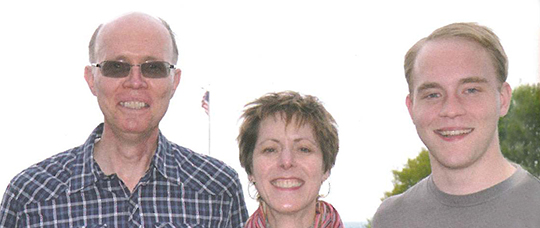Robert Conachey, Class of 1980, has been working on special projects, some unrelated to his Webb education, for most of his career, and he enjoys every minute of it. He attributes his success in working on these disparate activities to his natural curiosity along with a broad, well-rounded education at Webb.
Bob was very interested in math and science as a child. One of his hobbies was stamp collecting, which exposed him to history and politics of other countries. He would look up the location of the countries on a map or read further about their history in an encyclopedia. Little did he know how useful this interest would become when he chose a maritime career.
Bob applied to Webb and was admitted with less than four days remaining for the May 1st final decision. As for all engineering majors, Bob worked hard and did his share of all-nighters. He was elected class president and Student Organization President (aka Dictator) until being relegated to the faceless masses over some paperwork controversy involving something called a constitution.
Upon graduation he joined Exxon International’s Tanker Department in Florham Park, NJ, working on development projects addressing anti-fouling coatings and determining if office computers could be installed onboard tankers and accepted and used by crew members. Even though such projects were peripherally referred to at Webb, Bob’s curiosity and initiative more than made up for his deficiencies. Two years later he was offered a temporary assignment in New Orleans at Avondale Shipyards as a steel inspector for the construction of three products carriers. This experience proved very useful throughout Bob’s career. As an expected bonus, Bob met his wife of 29 years on that assignment! Upon his return to New Jersey, Bob worked on several energy-efficiency and monitoring projects.
Two years later, Bob joined the American Bureau of Shipping to work in the Machinery Department in the rotating equipment group. While there he was exposed to all types of equipment, design philosophies and participation in various forensic analyses of failed equipment. ABS relocated its offices to Houston, TX, in 1991, and Bob was promoted to Principal Engineer of that group. In 1999 Bob was transferred to the Corporate Technology Department to work on a special project seeking improvement of machinery reliability through maintenance. Bob had never been exposed to reliability engineering or maintenance theory, but in Webb fashion, got up to speed quickly. This resulted in the publication of the ABS Guide for Surveys Based on Reliability-Centered Maintenance.
Several years later Bob was asked to participate in a winterization committee to create a guide addressing details of vessels’ systems not covered by the Ice Class Rules. This turned out to be a fascinating area of marine engineering by applying risk principles so as to address those areas of the vessel that were paramount to successful operation in low temperatures. Besides issues with diesel engines, electrical equipment and lifesaving equipment, human response to cold temperatures, extended daylight and suitable clothing were additional concerns. He participated in several seminars detailing the requirements and traveled to several overseas ABS offices to train staff.
About this time Bob was supervisor of the Safety Analysis Group. This group analyzed various ABS-generated data, engineering and survey reports. This information could be used to determine the presence of trends or improve design reviews or surveys. With the encouragement and support of his wife, Shirley, and ABS management, Bob pursued a MS in Industrial Engineering at University of Houston in the evenings. He successfully achieved this life goal in December 2012. Some of the courses he thought would be easy, such as reliability engineering and advanced statistics, were more difficult than anticipated. Some of the industrial engineering courses presented challenges because Bob had no background in those topics such as simulation, linear optimization and human factors. Soon after beginning classes, Bob realized he thoroughly enjoyed this much needed “tune-up”.
The graduate school experience exposed Bob to numerous ideas and more technological innovations. It showed the importance of additional higher education to maintain skills and to acquire new skills. Bob was reminded of a conversation with a career counselor who informed him that one could expect to work in five to seven jobs over his career, and three of those jobs do not presently exist. Accordingly, one needs to keep abreast of change and be open to new ideas.

